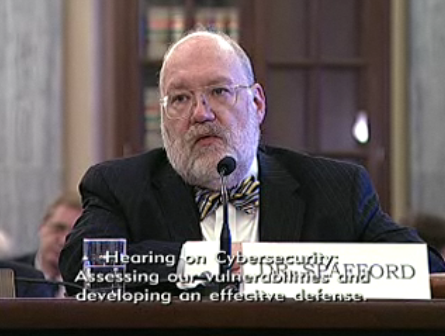Posts tagged testimony
Page Content
Cyber security challenges and windmills
[Note: the following is primarily about U.S. Government policies, but I believe several points can be generalized to other countries.]
I was editing a section of my website, when I ran across a link to a paper I had forgotten that I wrote. I'm unsure how many people actually saw it then or since. I know it faded from my memory! Other than CERIAS WWW sites and the AAAS itself, a Google search reveals almost no references to it.
As background, in early April of 2002, I was asked, somewhat at the last moment, to prepare a paper and some remarks on the state of information security for a forum, Technology in a Vulnerable World, held on science in the wake of 9/11. The forum was sponsored by the AAAS, and held later that month. There were interesting papers on public health, risk communication, the role of universities, and more, and all of them are available for download.
My paper in the forum wasn't one of my better ones, in that it was somewhat rushed in preparing it. Also, I couldn't find good background literature for some of what I was writing. As I reread what I wrote, many of the points I raised still don't have carefully documented sources in the open literature. However, I probably could have found some published backup for items such as the counts of computer viruses had I spent a little more time and effort on it. Mea culpa; this is something I teach my students about. Despite that, I think I did capture most of the issues that were involved at the time of the forum, and I don't believe there is anything in the paper that was incorrect at that time.
Why am I posting something here about that paper, One View of Protecting the National Information Infrastructure, written seven years ago? Well, as I reread it, I couldn't help but notice that it expressed some of the same themes later presented in the PITAC report, Cyber Security: A Crisis of Prioritization (2005), the NRC report Towards a Safer and More Secure Cyberspace (2007), and my recent Senate testimony (2009). Of course, many of the issues were known before I wrote my paper -- including coverage in the NRC studies Computers at Risk: Safe Computing in the Information Age (1991), Trust in Cyberspace (1999) and Cybersecurity Today and Tomorrow (2002) (among others I should have referenced). I can find bits and pieces of the same topics going further back in time. These issues seem to be deeply ingrained.
I wasn't involved in all of those cited efforts, so I'm not responsible for the repetition of the issues. Anyone with enough background who looks at the situation without a particular self-interest is going to come up with approximately the same conclusions -- including that market forces aren't solving the problem, there aren't enough resources devoted to long-term research, we don't have enough invested in education and training, we aren't doing enough in law enforcement and active defense, and we continue to spend massive amounts trying to defend legacy systems that were never designed to be secure.

Given these repeated warnings, it is troubling that we have not seen any meaningful action by government to date. However, that is probably preferable to government action that makes things worse: consider DHS as one notable example (or several).

Compounding the problem, too many leaders in industry are unwilling to make necessary, radical changes either, because such actions might disrupt their businesses, even if such actions are in the public good. It is one of those "tragedy of the commons" situations. Market forces have been shown to be ineffective in fixing the problems, and will actually lead to attempts to influence government against addressing urgent needs. Holding companies liable for their bad designs and mistakes, or restricting spending on items with known vulnerabilities and weaknesses would be in the public interest, but too many vendors affected would rather lobby against change than to really address the underlying problems.

Those of us who have been observing this problem for so long are therefore hoping that the administration's 60 day review provides strong impetus for meaningful changes that are actually adopted by the government. Somewhat selfishly, it would be nice to know that my efforts in this direction have not been totally in vain. But even if nothing happens, there is a certain sense of purpose in continuing to play the role of Don Quixote.
Sancho! Where did I leave my horse?
Why is it that Demotivators® seem so appropriate when talking about cyber security or government? If you are unfamiliar with Despair.com, let me encourage you to explore the site and view the wonderfully twisted items they have for sale. In the interest of full disclosure, I have no financial interest or ties to the company, other than as a satisfied and cynical customer.
On a more academic note, you can read or purchase the NRC reports cited above online via the National Academies Press website.
This time, the Senate
On March 19, I had an opportunity to testify before the Senate Committee on on Commerce, Science, and Transportation. The hearing was entitled Cybersecurity -- Assessing Our Vulnerabilities and Developing An Effective Defense.
I was asked to include information on research problems, educational initiatives, and issues regarding the current state of cyber security in the nation. As is usual for such things, the time between the invitation and the due date for written testimony was short. Thus, I didn't have the time to delve deeply into the topic areas, but could only address the things that I already had on hand -- including some posts from this blog that I had written before. The result was a little longer than the other statements, but I think I covered more ground.
One hint for people testifying before Congress on such things: you can't depend on how long you will have for spoken remarks, so be sure any points you want to make are in your written testimony. In this case, the hearing was limited to about 75 minutes because there were several votes scheduled on the Senate floor, and the committee needed to adjourn to allow the Senators to attend the votes. And, as is common for too many hearings, there weren't many of the committee members present; I believe the hearing began with only two of the 25 members present, and some movement of members in and out to reach a maximum of four seated at any one time. In this case, the chair (Senator Jay Rockefeller of West Virginia) apologized to us several times for the low turnout. However, many (all?) of the staff and aides were present, so I'm certain the gist of the testimony presented will be considered.
The Senator made a nice introductory statement.
My written testimony is available on my website as well as the committee site. My oral statement was from rough notes that I modified on the fly as I listened to the other testimony (by Jim Lewis, Eric Weiss and Ed Amoroso). That statement, and the whole hearing, are available via the archived hearing webcast (my remarks start at about 46:30 into the webcast). If I get a transcribed version of those remarks, I will post them along with my written testimony on my website in the "US government" section.
Comments by the other speakers were good overall and I think we collectively covered a lot of ground. The questions from the Senators present indicated that they were listening and knew some of the problems in the area. The comments from Senator Nelson about the intrusions into his systems were surprising: several Senate security staff were present at the hearing and indicated to me that his remarks were the first they had heard of the incidents! So, the hearing apparently set off an incident-response exercise -- separate from responding to my presence in the building, that is. ![]()
Will this hearing make a difference? I don't know. I've been testifying and saying the same things for over a dozen years (this was my 8th Congressional hearing testimony) and things haven't gotten that much better...and may even be worse. Senator Rockefeller has indicated he intends to introduce legislation supporting more funding for students studying cyber security issues. There was some good news coverage of all this (e.g., FCW and CNet).
I am told that there will be more hearings by this committee. Some House committees have been holding hearings too, and the President's 60 day review continues apace. The added attention is great, but with the sudden interest by so many, the result may be more confusion rather than resolution.
Stay tuned.
As a reminder, if you want to know about my occasional postings such as this but don't want to subscribe to the RSS feed, you can subscribe to the mailing list.
Also as a reminder, there is my tumble blog on security issues, with links to items on the news and WWW of possible interest to those who find my ramblings and rants of interest.
Spaf giving testimony to US Congress today
Just a quick note that Eugene Spafford, Executive Director of CERIAS, will be giving testimony this morning at 10 a.m before the House Ways and Means Committee at a “Hearing on Employment Eligibility Verification Systems and the Potential Impacts on SSA’s Ability to Serve Retirees, People with Disabilities, and Workers.” You can view the broadcast live by visiting the hearing’s page and clicking on “Click Here to View Committee Proceedings Live.”

